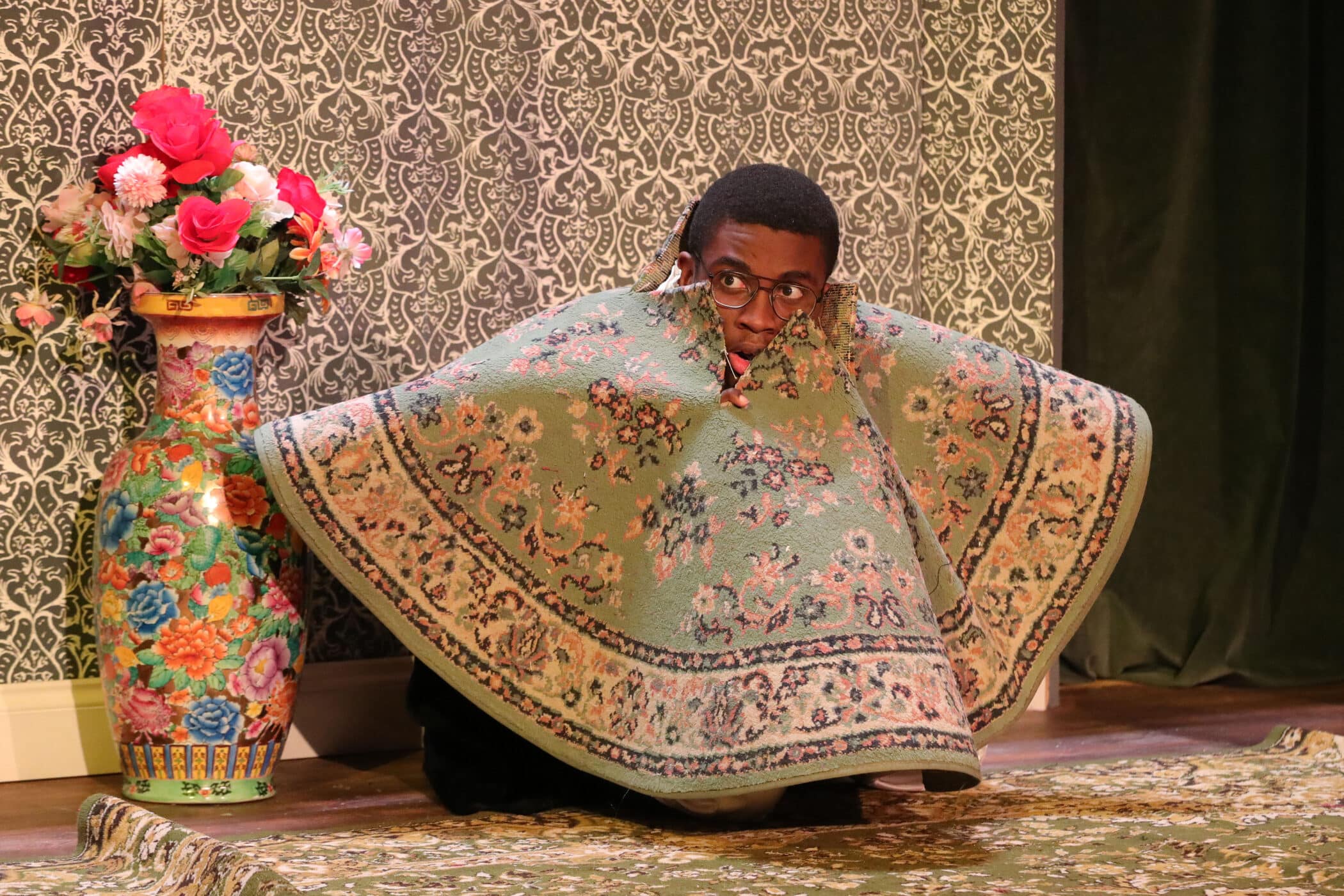For his first production at Epsom College, Mr Damon Young, our new Assistant Head of Drama, has treated us to a hilarious depiction of a household in disarray, taking us into the heart of the sort of domestic dynamic that we will all be hoping to avoid as we prepare to spend more time with our own families this Christmas.
As is often the case in such circumstances, the battle lines of the warring factions have fallen either side of a single divisive totem. This being 17th century Paris, the argument is not about Brexit or brussels sprouts but rather the continuing presence of Tartuffe, a religious charlatan who (like Rasputin with the Romanovs) has used extravagant displays of false piety to ingratiate himself into the house of Orgon. George Mecrate-Butcher plays the titular role with sprightly élan, combining oleaginous charm and Machiavellian menace with the rambunctious swagger of a con man who knows he has his mark dancing on a string. He is well supported by his sidekick Laurent, portrayed by Daniel Strange as the Crabbe/Goyle to Mecrate-Butcher’s Malfoy.
The sumptuous set gives us a clue for working out Tartuffe’s likely motivation in wheedling his way into the affections of this bourgeois pater familias. The curtain opens to invite us into a plush interior draped in the trappings of upper middle class material comfort, centred on a red velvet chaise longue that wouldn’t look out of place in the dim recesses of a Parisian boudoir. Indeed, this hints at some of Tartuffe’s more sinister aims, most notably his attempted seduction of Orgon’s wife Elmire, played with expert skill by Emily Mitchell, to present a shape-shifting character whose alternating patterns of demure aloofness and coquettish liberality keep us guessing as to her true intentions. Given that Tartuffe’s unholy transgression does not happen until Act 3 of the play, our image of him is mediated entirely through the testimony of the two rival camps.
Orgon’s mother Madame Pernelle (Tessa Vafai) opens the defence case for Tartuffe with a hysterical series of vitriolic character assassinations of the other members of the household: servant Dorine is an impertinent busy-body; son Damis is a fool; daughter Mariane is a butter-wouldn’t-melt hypocrite; lady of the house Elmire is a reckless spendthrift whose outfit choices lead one to suspect that she has more than her husband in mind when she gets dressed in the morning. This exposition is delivered by Vafai with madcap conviction and, before being escorted from the stage by her servant Flipote (Anna Valieva), she doles out the sort of slurred tongue-lashings one might expect from an elderly relative whose threadbare inhibition has finally been removed by indulging in one too many Bristol Creams.
However, there is no doubt that the head of the cabal of Tartuffe proselytisers is Orgon himself, expertly depicted by Chris Lusala as a man clearly besotted. Heralding his own first entrance on stage with the fanfare of a kazoo tells us almost all we need to know about his state of mind and he subsequently wanders round the stage absorbed in the misty-eyed reverie of a lovesick teenager. With his puritanical sermons, Tartuffe has taught Orgon to look at the world as upon a dung heap and upon material possessions as frivolous baubles that will stand in the way of his salvation. Not that this will stop Tartuffe from trying to sweep up that which has been foregone, including his dupe’s wife, daughter and keys to his house.
Trying to stop this folly are the same set of characters who started the play under the torrent of Madame Pernelle’s rage. The chief prosecutors are Dorine (Emma Wright) and Cléante (Amaara Alikhan), who approach their cross-examination of Tartuffe from different ends of the social spectrum. Dorine is the salt of the earth servant and is played by Wright as a quick-witted straight talker who is not afraid to speak truth to power despite this regularly provoking the ire of the hand that feeds her. As in many farces, Dorine defies her lowly status and proves to be a central catalyst of the dramatic action with her witty one-liners and put downs. Cléante, Orgon’s eminently reasonable sister-in-law, adopts a more long-winded approach and her sanctimonious appeals to logic have a visibly soporific effect. Indeed, Orgon literally starts to nod off whilst on the receiving end of one particularly priggish lecture about the difference between true and false devotion. Alikhan inhabits the role with measured sobriety, delivering her pronouncements from on high as if from the lay pulpit of the cathedral of reason.
Whereas Cléante approaches matters from the dry, intellectual perspective of a disinterested equal, the young lovers of the play are hostage to Orgon’s mercurial whims and therefore have a far more vested interest in pulling the wool from his eyes and stopping Tartuffe’s skulduggery in its tracks. The basic amorous equation before the intrusion of this malevolent outsider was as follows: Orgon’s daughter Mariane (Amelia Renford-Fox) was to marry Valère (Dev Sharma), a union which is itself a condition precedent for the marriage of Orgon’s son Damis (James Roberts) to Valère’s sister. With Orgon intent on making Tartuffe his son-in-law instead of Valère, the whole chain of causation has been thrown into disarray. The reaction to this fallout provides some of the heights of comedy in the play, which relies on the melodramatic teenage swoons of Renford-Fox, the cloying hypersensitivity of Sharma’s 17th century ‘soft boi’, and Roberts’ hormone-fuelled Damis who at one point literally explodes with rage out of a cabinet in which he has been hiding.
Neither the reasoned arguments of Cléante or the irrational outbursts of Damis have done anything to dissuade Orgon from his self-destructive path and it is only when he witnesses Tartuffe’s second attempted seduction of Elmire that he realises that he has been had. By this stage it is too late as Orgon has signed his estate irrevocably over to Tartuffe. This is a claim being pursued by the ironically named Madames Loyal, played by Genevieve Chan and Sophie Norman with the sly menace of a bailiff whispering “lovely vase that, terrible shame if anything should happen to it”. What has been a comedy looks like it might turn into a tragedy as Tartuffe is also now in possession of compromising documents that link Orgon with a seditious plot against Louis XIV. The only impediment to this final act of blackmail becoming Tartuffe’s vindicating apotheosis is the intervention by the king’s representative (played by Kristy McGuire with declaratory pomp and ceremony). Word of the ne’er-do-well has reached the king who in his infinite wisdom has decided to convict Tartuffe and acquit Orgon. This restores the order of the household and the curtain closes with explosions of confetti and the sounds of the Marseillaise, which seems like a fittingly triumphant way to seal this fabulous production that romps with laughter from beginning to end.
Epsom College – 2022 Tartuffe
Epsom College – 2022 Tartuffe
Epsom College – 2022 Tartuffe
Epsom College – 2022 Tartuffe
Epsom College – 2022 Tartuffe
Epsom College – 2022 Tartuffe
Epsom College – 2022 Tartuffe
Epsom College – 2022 Tartuffe
Epsom College – 2022 Tartuffe
Epsom College – 2022 Tartuffe
Epsom College – 2022 Tartuffe
Epsom College – 2022 Tartuffe
Epsom College – 2022 Tartuffe
Epsom College – 2022 Tartuffe
Epsom College – 2022 Tartuffe
Epsom College – 2022 Tartuffe
Epsom College – 2022 Tartuffe
Epsom College – 2022 Tartuffe
Epsom College – 2022 Tartuffe
Epsom College – 2022 Tartuffe
Epsom College – 2022 Tartuffe
Epsom College – 2022 Tartuffe
Epsom College – 2022 Tartuffe
Epsom College – 2022 Tartuffe
Epsom College – 2022 Tartuffe
Epsom College – 2022 Tartuffe
Epsom College – 2022 Tartuffe
Epsom College – 2022 Tartuffe
Epsom College – 2022 Tartuffe
Epsom College – 2022 Tartuffe
Epsom College – 2022 Tartuffe
Epsom College – 2022 Tartuffe
Epsom College – 2022 Tartuffe
Epsom College – 2022 Tartuffe
Epsom College – 2022 Tartuffe
Epsom College – 2022 Tartuffe
Epsom College – 2022 Tartuffe
Epsom College – 2022 Tartuffe
Epsom College – 2022 Tartuffe
Epsom College – 2022 Tartuffe
Epsom College – 2022 Tartuffe
Epsom College – 2022 Tartuffe
Epsom College – 2022 Tartuffe
Epsom College – 2022 Tartuffe
Epsom College – 2022 Tartuffe
Epsom College – 2022 Tartuffe
Epsom College – 2022 Tartuffe
Epsom College – 2022 Tartuffe
Epsom College – 2022 Tartuffe
Epsom College – 2022 Tartuffe
Epsom College – 2022 Tartuffe
Epsom College – 2022 Tartuffe
Epsom College – 2022 Tartuffe
Epsom College – 2022 Tartuffe
Epsom College – 2022 Tartuffe
Epsom College – 2022 Tartuffe
Epsom College – 2022 Tartuffe





